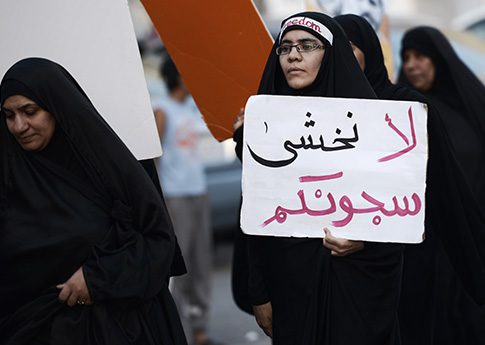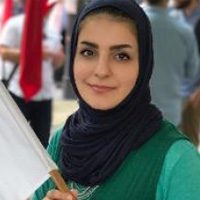Since mid-2016, the Bahraini authorities have dramatically stepped up their crackdown on dissent.
By June 2017, Bahrain’s formerly thriving civil society had found itself reduced to a few lone voices brave enough to speak out. The majority of peaceful critics, whether they are human rights defenders or political activists, now feel the risk of doing so has become too high. Over the course of a year, the authorities increasingly resorted to a wide range of repressive tactics including arrest, harassment, threats, prosecution and imprisonment to silence peaceful critics. Amnesty International’s research concludes that the security forces have even resorted to torturing or otherwise ill-treating human rights defenders, both men and women, a practice that has not been prevalent in Bahrain since the height of the crackdown that followed the 2011 uprising.
Most of us are really afraid of what will happen.
Human rights defender who has requested anonymity


From harassing activists…
During the period between June 2016 and June 2017, Amnesty International found that at least 169 critics or their relatives were arrested, summoned, interrogated, prosecuted, imprisoned, banned from travel or threatened. Human rights defenders, lawyers, journalists, political activists and leaders, Shi’a clerics, and peaceful protesters have been particularly impacted.
They beat me on my nose and they kicked me in the stomach. I fainted twice. I was threatened that they would harm my family. The men told me 'no one can protect you.'
Ebtisam al-Saegh, woman human rights defender
The Bahraini authorities have also targeted the only independent newspaper in Bahrain, al-Wasat, temporarily suspending its online edition in January 2017 and arbitrarily closing it down entirely in June. They have additionally dismantled the political opposition, dissolving the main opposition group, al-Wefaq National Islamic Society, and opposition political party Waad on the basis of what Amnesty International has found to be unfounded charges.
… to killing protesters.
Security forces, including the National Security Agency (NSA), have increasingly used excessive force, beating peaceful protesters, firing shotguns and semi-automatic rifles, and firing tear gas from armoured personnel vehicles or helicopters into houses or directly at protesters. Since the beginning of 2017, security forces have killed six people, including one child, and injured hundreds.
Repressive Tactics to Silence Critics

Video
Human Rights Defenders Targeted in the past year






Amnesty International urges the Bahraini authorities to:
• cease their crackdown on the rights to freedom of expression, association, and peaceful assembly;• immediately and unconditionally release all prisoners of conscience;
• halt the reprisals against human rights defenders, other peaceful critics and their relatives;
• stop the targeting of political opposition parties and closing independent newspapers;
• urgently prevent the torture and other ill-treatment of human rights defenders, political activists and other detainees; and,
• rein in security forces and ensure prompt, independent and effective investigations into allegations of violations.


Complicit Silence of the International Community
The heightened crackdown in Bahrain should be understood within the wider geopolitical context. The election of US President Donald Trump and his new administration’s apparent deprioritization of human rights in US foreign policy seems to have encouraged Bahrain’s government to be bolder in its attempts to silence dissent. The UK, which has heavily invested in Bahrain’s reform programme and which has a “special” relationship with Bahrain, has looked to ensure closer trade ties with Gulf countries since the UK voted to leave the European Union. Its response to the deterioration of human rights in Bahrain has been weak. This, coupled with the lack of criticism by fellow member states in UN forums, has emboldened Bahrain further.
If you are outraged by this silence, raise your voice and push your government to publicly condemn the human rights crackdown in Bahrain.
Tweet at your government handles
Amnesty International urges states within the international community that have influence in Bahrain to publicly and privately condemn the crackdown in Bahrain. It is also appealing to states supplying equipment to Bahrain that could be used for internal repression, including firearms, less lethal equipment and armoured vehicles, to stop transfers to Bahraini law enforcement agencies until the Bahraini authorities allow prompt, independent and impartial investigations into the allegations of abusive or arbitrary use of force.
Bahraini human rights defenders continue to speak out despite the risks. Will you add your voice to theirs?

